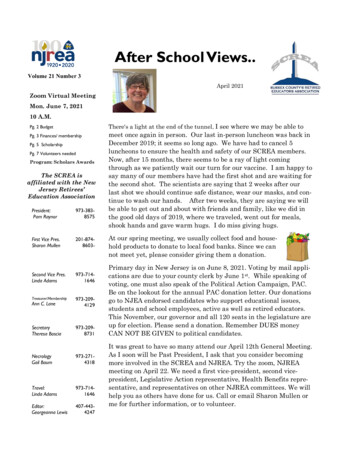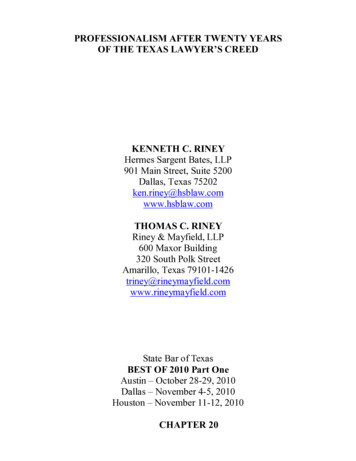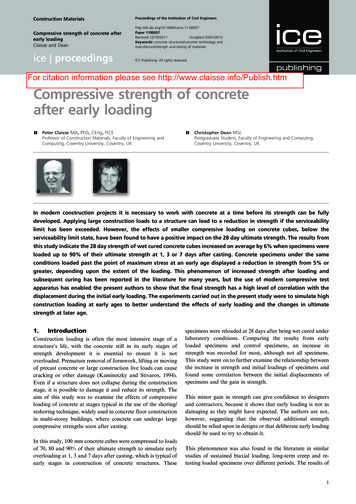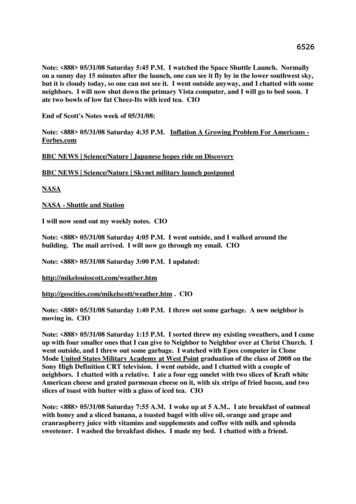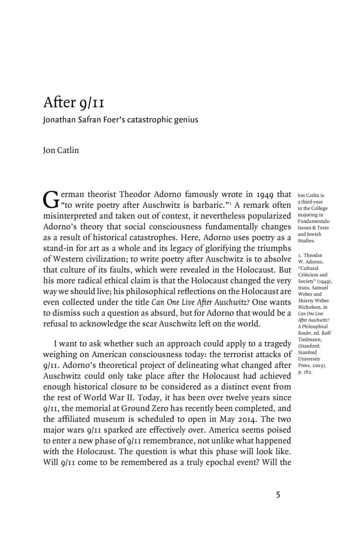
Transcription
After 9/11Jonathan Safran Foer’s catastrophic geniusJon CatlinGerman theorist Theodor Adorno famously wrote in 1949 that“to write poetry after Auschwitz is barbaric.”1 A remark oftenmisinterpreted and taken out of context, it nevertheless popularizedAdorno’s theory that social consciousness fundamentally changesas a result of historical catastrophes. Here, Adorno uses poetry as astand-in for art as a whole and its legacy of glorifying the triumphsof Western civilization; to write poetry after Auschwitz is to absolvethat culture of its faults, which were revealed in the Holocaust. Buthis more radical ethical claim is that the Holocaust changed the veryway we should live; his philosophical reflections on the Holocaust areeven collected under the title Can One Live After Auschwitz? One wantsto dismiss such a question as absurd, but for Adorno that would be arefusal to acknowledge the scar Auschwitz left on the world.I want to ask whether such an approach could apply to a tragedyweighing on American consciousness today: the terrorist attacks of9/11. Adorno’s theoretical project of delineating what changed afterAuschwitz could only take place after the Holocaust had achievedenough historical closure to be considered as a distinct event fromthe rest of World War II. Today, it has been over twelve years since9/11, the memorial at Ground Zero has recently been completed, andthe affiliated museum is scheduled to open in May 2014. The twomajor wars 9/11 sparked are effectively over. America seems poisedto enter a new phase of 9/11 remembrance, not unlike what happenedwith the Holocaust. The question is what this phase will look like.Will 9/11 come to be remembered as a truly epochal event? Will the5Jon Catlin isa third-yearin the Collegemajoring inFundamentals:Issues & Textsand JewishStudies.1. TheodorW. Adorno,“CulturalCriticism andSociety” (1949),trans. SamuelWeber andShierry WeberNicholsen, inCan One LiveAfter Auschwitz?A PhilosophicalReader, ed. RolfTiedmann,(Stanford:StanfordUniversityPress, 2003),p. 162.
after 9/11people of our generation take up the phrase “After 9/11”? And if theydo, will this call for a reformulation of all of Western civilization, asAuschwitz does for Adorno, or affect us only as Americans?One of the most prominent figures asking these questions todayis Jonathan Safran Foer, a thirty-six-year-old Jewish-Americanwriter whose two novels put responses to these very catastrophes indialogue. Foer is uniquely positioned to comment on the status of9/11 in a broader cultural context. As a New Yorker, he sympathizeswith those Americans, especially children, for whom the event wasuniquely traumatizing. But as the grandson of two survivors of theHolocaust and a writer who positions himself in its shadow, Foeralso considers 9/11 in a comparative light. Foer’s responseis therefore ambivalent, or, more precisely, double. Hisapproach does not necessarily disqualify 9/11 fromepochal status, but it does necessitate a move awayfrom American exceptionalism and toward a moreuniversal concern for human suffering.from the holocaust to 9/11It is away Ihave ofdrivingoff thespleen,and regulating thecirculation.On February 1, 2013, President Obamatapped Foer for the United States HolocaustMemorial Council, the body that oversees thenational memorial and museum, making him oneof the youngest members ever appointed. Thisnew title makes Foer’s literary status semi-official:the writer of catastrophe for his generation.Foer’s engagement with catastrophe began with his first book,Everything Is Illuminated (2002), a fictionalized account of an event inFoer’s own life. One summer, while a philosophy major at Princeton,the protagonist (named Jonathan Safran Foer) travels to the Ukrainelooking for the woman who had saved his Jewish grandfatherduring the Holocaust. He hires a translator and drives throughthe countryside looking for a lost shtetl, Trachimbrod. As it turnsout, nothing remains of the town: its inhabitants and the site werecompletely destroyed during the war. But one woman who remainshas miraculously preserved the Jews’ possessions and stories.6
jon catlinEverything is a story of loss, but also the wonders of coincidence andmemory. The novel is written as a series of letters between Jonathanand his translator, Alex. The friendship they develop signals hope—from both perspectives—for Gentile-Jewish reconciliation. ButJonathan is also off on his own project: when he can’t recover the realhistory of the Jews of the town, he creates a mythology for them goingback hundreds of years, complete with festivals, orgies, and foundingfolklore. Foer seems to suggest that this leap into imagination is justJonathan’s way of mourning. When there’s nothing left of his realfamily history because it has been so completely destroyed, he mustcreate it in order to achieve closure.What’s really true in Foer’s story? Though Foer’s grandfathersurvived the Holocaust, he lost a daughter and his first wife, and thattrauma is what Foer takes up in his writing. Crucial is the fact thatFoer’s grandfather died long before Foer was born, so even the storyof his grandfather’s survival is one level removed. Philippe Coddethus considers Foer representative of third-generation Holocaustvictims: “those who were not directly affected by the event, but whonevertheless seem to carry the burden of this traumatic past.”2 Coddealso suggests that subsequent generations can become even morehaunted by the traumatic event than the first, “due to the obsessionthat arises with the black hole, the hidden horror in their familyhistory,” especially when the survivors do not share their experiences.As Jonathan narrates in Everything, “The origin of a story is alwaysan absence,” and he writes as if he had no choice but to fill thatabsence with narratives spun from the scraps of information he wasleft with.3 Dominick LaCapra would consider this a healthy responseto trauma in that it constitutes “acknowledging and affirming, orworking through, absence as absence,” rather than mistaking one’sancestral loss for one’s own loss and thinking of oneself as a victim.4For LaCapra, accepting absence and working through it “requires therecognition of both the dubious nature of ultimate solutions and thenecessary anxiety that cannot be eliminated from the self or projectedonto others.” It involves accepting anxiety about the past as one’s ownand “opens up empowering possibilities in the necessarily limited,nontotalizing, and nonredemptive elaboration of institutions andpractices in the creation of a more desirable, perhaps significantly72. PhilippeCodde,“KeepingHistory atBay: AbsentPresencesin ThreeRecent JewishAmericanNovels,” ModernFiction Studiesvol. 57, n. 4(Winter 2011):673-4, 675.3. JonathanSafran Foer,Everything IsIlluminated(New York:HoughtonMifflin, 2002),p. 230.4. DominickLaCapra,Writing History,Writing Trauma(Baltimore: TheJohns HopkinsUniversityPress, 2001),p. 58.
after 9/11different—but not perfectly unified—life in the here and now.”Everything is the story of a hopeful young Foer working toward thatuneasy acceptance of his family’s past.Everything won the National Jewish Book Award in 2002 andestablished Foer as an important Jewish writer. Though the book isimpressive, Foer delves even deeper into the aftermath of catastrophein his 2005 Extremely Loud and Incredibly Close. Extremely Loud is on itssurface the story of a nine-year-old boy, Oskar, who loses his fatheron 9/11. The story is told mostly through Oskar’s own voice; heexaggerates much of what he sees and uses phrases like “extremelyhilarious,” which give the book its title. Oskar goes on a quest aroundNew York City to find the lock for a key he found that he believes tobe his lost father’s, sharing the story of his loss with the people hemeets and achieving closure on his father’s death in the process.The act ofpaying is perhaps the mostuncomfortable inflictionthat the twoorchardthievesentaileduponus.The use of a disorienting, untraditional voice isn’t new for Foer,who wrote Everything partly in the equally-entertaining, Borat-likevoice of Foer’s Ukrainian translator Alex, which brings unexpectedhumor to a tragic story. As if this weren’t enough, Foer disorientsthe reader of Extremely Loud by interspersing images Oskar collectsfor his scrapbook, “Stuff That Happened to Me.” Chapters narratedby Oskar alternate with unsent letters written by his grandparents,who fled Germany after the allied bombing of Dresden decadesearlier. Between these several narrators, pages come in all varieties—some blank, others containing one word, some corrected with redpen, others totally full of numbers, and still others onwhich the letters get gradually closer together untilthe page is almost solid black with ink. The struggleof communicating trauma is made visible: sometimesthere is nothing one can say, and other times there arenot words to communicate what one needs to say.These imaginative representationalstrategies are inspired by the manyliterary references Foer incorporates intohis works. The name of Extremely Loud’sOskar is borrowed from the protagonistof German writer Günter Grass’s The Tin8
jon catlinDrum, the story of another traumatized boy’s fantastical travels inthe wake of World War II. The photographs of banal items scatteredthroughout Extremely Loud recall those in W.G. Sebald’s Austerlitz,the story of a Jewish man who escaped the Holocaust as an infantfrom Czechoslovakia on a Kindertransport to Britain. As DeborahSolomon remarked, “Foer might be called a European novelist whohappens to be writing in America.”5why write the catastrophe?Foer remarked on the subjects of his novels in an interview: “Boththe Holocaust and 9/11 were events that demanded retellings The accepted versions didn’t make sense for me. I always write out ofa need to read something, rather than a need to write something. With9/11 in particular, I needed to read something that wasn’t politicized orcommercialized, something with no message, something human.”6Foer attempted to return to 9/11 and rethink it from the ground up.As he said on another occasion, “We need as many voices as possiblebecause unfortunately our national storytellers about [9/11] havebeen politicians and they’ve been telling a story so different thanmost people I know experienced the day.”7 Foer’s personal responseto 9/11 was more open-ended: “profound sadness,” as he put it, or, asOskar frequently says, “heavy boots.”Foer attempts to convey this open sense of loss indirectly byjuxtaposing 9/11 with fictional survivor testimonies of the alliedbombings of Dresden and Hiroshima during World War II. Oskar’sgrandparents are survivors of the allied bombing of Dresden, anddeeply traumatized individuals, though Oskar is too young to thinkof them as such. The reader learns of their trauma mostly throughletters Oskar’s grandfather writes to his unborn son, who perished inutero during the bombings. In the course of a school project, Oskarthen stumbles upon an oral testimony of a man who lived throughthe bombing of Hiroshima that Foer transcribes in the novel. Thesecounter-narratives, hastily written off as “thrown in”8 and “in here,too, for good measure”9 by dismissive critics, serve the importantrole of situating 9/11 in a broader, more self-reflective framework.“The way September 11 is talked about in America is entirely95. DeborahSolomon, “TheRescue Artist,”New York TimesMagazine, 27Feb., 2005.6. Ibid.7. DavidSwatling,“ImaginationIs theInstrument ofCompassion,”RadioNetherlandsWorldwide, 4Feb., 2010.8. Walter Kirn,“‘ExtremelyLoud andIncrediblyClose’:Everything IsIncluded,” NewYork Times BookReview, 3 Apr.,2005.9. John Updike,“MixedMessages,” TheNew Yorker, 15Mar., 2005.
after 9/1110. Swatling,2010.without any kind of global or historical context,” Foer remarked.“It’s talked about in absolutes—absolute good and evil, absoluteterror and justice—with no perspective I thought including[Dresden and Hiroshima] was not only a way of introducing a kind ofhistorical perspective but also to reiterate how awful it is when thesethings happen.”10 Foer thus describes Extremely Loud as a humanisticintervention into the 9/11 discourse, not a political one. But we can’thelp but note that the bombings of both Dresden and Hiroshimawere inflicted by America on other civilian populations. Roughly25,000 civilians perished in the allied fire-bombing of Dresden, andthe US atomic bombing of Hiroshima killed over 100,000. Nearly3,000 Americans perished in the 9/11 attacks. We have by and largejustified the former as a society in the name of winning World WarII. Yet from the same limited American perspective, 9/11 seemsanomalous and uniquely evil, paving the way for political argumentsfor American exceptionalism. By juxtaposing distant narratives ofAmerican-inflicted suffering with one of American suffering close tohome, Foer puts moral closure on each of them into question.we don’t need the truthC11. SteveAlmond, “TheBoy Who KnewToo Much,” TheBoston Globe, 3Apr., 2005.ritics reviewed Extremely Loud harshly, but not on account ofFoer’s writing alone: many were apparently upset by what theyperceived as an evasion of 9/11 itself in a novel about 9/11. Annoyedby the novel’s playful design and unorthodox narrative voices, onereviewer wrote, “A man like Thomas Schell”—Oskar’s father, whoseperspective we get only indirectly, through the phone messages heleaves for Oskar while trapped in the burning towers—“has a rivetingstory to tell, after all. We don’t need gimmicks to keep our attention;we just need the truth.”11 This criticism echoes across most reviews ofExtremely Loud: enough with the literary gimmicks, we want the truthabout 9/11—just set the scene, build the suspense, and vividly depictthe terror and outrage of the version of 9/11 most of us remember.But such a demand is not only unreasonable; it is also unimaginative.Foer circumlocutes the actual 9/11 attacks by delivering them throughOskar, a child who barely understands them. But this is no failure.Foer shows us that the task of good fiction is not to deliver somepurported truth, but to make us search for it ourselves in new places,10
jon catlinprecisely beyond the standard narratives we have already heard. Thatso many critics of Extremely Loud failed to take up Foer’s challengeexposes a deeper problem in American cultural consciousness. Overa decade after 9/11, established and unimaginative narratives ofthe event still dominate our attention. Architectural critic MichaelSorkin noted a year after 9/11 that the “endlessly ‘realistic’” languageof competing views on memorializing 9/11 failed to acknowledgethat “Every memorial invents the event it recalls. That ‘event’ of 9/11cannot simply be absorbed into things as they are: a year later it stillexceeds our ability to describe it.”12Joyce Carol Oates has noted a similar expectation of Americanaudiences with regards to 9/11 narratives. While much survivor andeyewitness testimony had already appeared, she wrote in 2006, “fewwriters of fiction have taken up the challenge and still fewer havedared to venture close to the actual event; September 11 has becomea kind of Holocaust subject, hallowed ground to be approachedwith awe, trepidation, and utmost caution.”13 In comparison toeyewitness accounts of such an inviolable subject, fictional accountslike Foer’s strike us as misplaced and inauthentic. “The popular biasfor memoir in our time, even fictionalized memoir,” she goes on, “isthis wish for ‘authenticity’ on the part of the author who has alsobeen a participant in his story.” American audiences want the thrill ofexperiencing the event from a “true” or “authentic” perspective thatinitiates a chain of emotional overidentification with the narrator,unquestioning solidarity with one’s fellow readers, and finallythe unearned closure of an easy, uplifting message at the story’sconclusion. But as a long tradition of the literature of catastropheshows us, a genuine response to catastrophe is far more complex.12. MichaelSorkin, “TheDimensionsof Aura,” AllOver the Map(London:Verso, 2011),p. 37.13. JoyceCarol Oates,“Dimming theLights,” TheNew York Reviewof Books, 6 Apr.,2006.the politics of narrative empathyImagination is the instrument of compassion” is a line by Polishpoet Zbigniew Herbert that resonates deeply with Foer. In fact, itinspired an explicit “After 9/11” pronouncement from him: “Bookshave a very important function in the world—a function moreimportant now than it was before September 11th—which is to tellstories of individuals, stories in which people in other cultures canrecognize themselves.”14 Along with historical context, Foer suggests1114. Swatling,2010.
after 9/11that such imaginative and morally complicating compassion—trying to understand the suffering of Americans in light of sufferingAmericans have inflicted on others—is what was missing fromAmerica’s 9/11 response. Foer’s “After 9/11” statement is a plea forcross-cultural understanding.15. ArtSpiegelman, Inthe Shadow of NoTowers, (NewYork: Pantheon,2004), p. 3.While Foer chose not to comment directly on the politics of9/11, cartoonist Art Spiegelman, a fellow New Yorker and child ofHolocaust survivors, did so bluntly in his comic strips collected asIn the Shadow of No Towers, a series he drew in the months following9/11. In his representations of 9/11, Spiegelman drew openly uponhis experience creating Maus, his Pulitzer Prize-winning graphicnarrative account of his parents’ experience at Auschwitz. At severalpoints in the comic on 9/11, Spiegelman represents himself as amouse, the same way he represents Jews in Maus (with cats as theirNazi captors). At one point, having turned mid-strip into a mouse,Spiegelman says, “I remember my father trying to describe what thesmoke in Auschwitz smelled like The closest he got was telling me itwas ‘indescribable’ That’s exactly what the air in Lower Manhattansmelled like after Sept. 11!”15 Spiegelman’s work makes evident theway we process new experiences through the lens of past ones. Givenhis secondhand experience of the Holocaust, Spiegelman witnessed9/11 through the lens of his Judaism as well as his terrified positionas a New Yorker worried about his family.Spiegelman openly expresses his political conclusions about 9/11in several panels in In the Shadow of No Towers:Nothing like the end of the world to help bring folks together But why did those provincial American flags have tosprout out of the embers of Ground Zero?Why not a globe?!1616. Ibid., p. 7.He also narrates a patriotic scene with a telling caption:By September ’04, Cowboy boots drop on Ground Zero asNew York is transformed into a stage set for the Republican12
jon catlinPresidential Convention, and Tragedy is transformed into Travesty 1717.Spiegelman,p. 10.Spiegelman suggests that such remembranceefforts actually helped America forget 9/11 as a realhistorical event. For stereotypically proud, cockyNew Yorkers, this meant moving on quickly from9/11: “On 9/11/01 time stopped. / By 9/12/01 clocksbegan to tick again / You go back to thinking youmight live forever after all!” For all Americans, the“Genuine Awe” of the attacks was “reduced to the mere‘Shock and Awe’ of jingoistic strutting.”A sweetandunctuousduty!When I recently viewed newspaper front pagesfrom September 12, 2001 on display at the Newseumin Washington DC, I observed just how common thissentiment was. The San Francisco Examiner ran the headline “Bastards!”across an image of the burning towers. Others ran the headlines“Outrage,” “Evil Acts,” “Mass Murder,” “War on America,” “It’sWar,” and “Bush Vows to Strike Back.”18 (More measured headlinesavoided these loaded labels and leaps to retaliation: “Terror,”“Attacks Shatter Nation,” “Unthinkable,” and the poignant “WeMourn” allowed the tragedy to sink in—at least for one day.)Ilka Saal considers Extremely Loud exemplary of the “universalizing”and “decentering” politics of the philosopher Judith Butler. Butlerwrites that “our collective experience of a cataclysmic event alwaysemerges within a particular narrative frame, and it is this very framethat can either open up or preclude ‘certain kinds of questions,certain kinds of historical inquiries.’”19 For Butler, the narrativeframe we adopt determines whether “the experience of violence andloss have to lead straightaway to military violence and retribution”or whether “something can be made of grief besides a cry for war.”20With regard to 9/11, Saal says that “while the event momentarilydisrupted the American nation’s narcissistic understanding of itself,providing it with an opportunity to acknowledge its interdependencywith other nations, the narratives triggered in its wake immediatelyshored up a first-person perspective that reasserted impenetrableboundaries between self and other.”211318. “Today’sFront Pages,”September11, es/defaultarchive.asp19. Ilka Saal,“Regarding thePain of Self andOther: TraumaTransfer andNarrativeFraming inJonathan SafranFoer’s ExtremelyLoud andIncredibly Close,”Modern FictionStudies vol. 47,n. 3 (Fall 2011):454.20. JudithButler,Precarious Life,(London:Verso, 2006),p. xi.21. Saal, p.454.
after 9/1122. Butler,p. 8.23. Ibid.,p. xii.Rather than settling for first-person accounts, Foer takes upButler’s challenge to “narrate ourselves not from the first personalone, but from, say, the position of the third, to receive an accountdelivered in the second.”22 He delivers an account of 9/11 throughthe eyes of Oskar, a child too young to politicize the event, and hisgrandparents, conflicted witnesses who have suffered their entirelives on account of American-inflicted destruction. These narrativesare themselves framed through Foer’s own encounter with theHolocaust, which appears in Extremely Loud as an ellipsis in theGrandfather’s narrative. In one of his letters to his unborn son, hementions Simon Goldberg, a Jewish friend of his father-in-law, whoafter disappearing from Germany sent him a short, touching letterfrom Westerbork transit camp in Holland. While the Grandfatherthinks he may have seen Goldberg after the war in New York, thereader knows how dubious this sighting would have been: detentionin Westerbork usually meant deportation to Auschwitz.These alternative, “decentering” narrative frames for 9/11 raisethe question, as Saal puts it, “What if the nation was to start thenarrative not on September 11 but earlier by way of deciphering thevery conditions that produced terrorism in the first place?” Butlerhopes that inhabiting these decentered positions of vulnerabilitymight prompt Americans to “endeavor to produce another publicculture and policy in which suffering unexpected violence andreactive aggression are not accepted as the norms of political life.”23True to his goal, Foer humanizes 9/11 by portraying the sufferingit caused intimately. Yet he similarly humanizes the sufferingof Dresden and Hiroshima. Foer’s universalized, rather thanexceptionalist, framing of suffering thus entails an unstated politicalconclusion. It is not simply the liberal flipside of the jingoismSpiegelman critiqued. It is a call for a human-centered outlook onsuffering, no matter how much of an “other” the victim may be.Foer’s work offers no direct commentary on the US government’sactions in the bombings of Dresden and Hiroshima, nor, for thatmatter, Afghanistan and Iraq. Instead, it raises up a mirror to thereader and asks her to see the suffering of innocent people for whatit is: unacceptable. Foer presents us with multiple catastrophes so14
jon catlinthat we see how each one affected its victims with similar intensity.As Susan Neiman writes on 9/11 in relation to other catastrophes,“Dividing evils into greater and lesser, and trying to weigh them,is not just pointless but impermissible.”24 Foer rightly avoids suchcomparison, but illustrates that each of the catastrophes in ExtremelyLoud entailed unacceptable suffering, no matter what the degree.Considering 9/11 through a wider narrative frame allows us to moreaccurately determine multiple things we find unacceptable about it,and to condemn this multiplicity of wrongs.24. SusanNeiman, Evil inModern Thought:An AlternativeHistory ofPhilosophy(Princeton:PrincetonUniversityPress, 2004),p. 286.learning from the pastWidening the lens through which one thinks about a particularcatastrophe also allows for more effective mourning, inaddition to better history. While critics have focused on Oskar’snarrative, his story comprises only half the book, and we are meantto read his narrative in light of his grandparents’, and vice versa. Hisgrandfather is traumatized into silence and speaks only throughthe tattoos “yes” and “no” on his palms and short written notes.Yet Oskar learns from his grandfather’s misery, even though thefamily is so dissolved that Oskar knows him only as “the renter” ofhis grandmother’s apartment. After the two dig up Oskar’s father’sempty coffin and fill it with the Grandfather’s unsent letters to him,“the renter reminded me that just because you bury something, youdon’t really bury it.”25 The past haunts Oskar, but he is on the pathtoward healing. Oskar’s generation (and Foer’s before his) has seenfirsthand how psychically destructive his grandparents’ generation’ssilence about their trauma was, and taken a different route.The Grandfather is a remarkablecharacter who embodies a deeplytraumatized, and now largelylost, generation of those whosuffered unimaginably in thewar. After his fiancée dies inthe bombing of Dresden, hemarries her sister, Oskar’sgrandmother.Theylivemiserable lives, haunted by25. JonathanSafran Foer,Extremely Loudand IncrediblyClose (New York:Mariner, 2005),p. 322.It requiresa strongmoralprinciple toprevent mefrom steppinginto thestreet, andmethodicallyknockingpeople’s hatsoff.15
after 9/1126. Foer,Extremely Loud,pp. 108, 181.27. nd History(Baltimore: TheJohns HopkinsUniversityPress, 1996),p. 6.28. Foer,Extremely Loud,p. 6.the past, and establish an impossible code of rules that keep themin separate “nothing spaces” so as to avoid the tragic reality of theirlives. One rule is particularly damaging: as the Grandfather writesin one of many unsent letters to Oskar’s father, “Your mother andI never talk about the past, that’s a rule.” When he leaves Oskar’sgrandmother, she asks, “Why are you leaving me?” He responds, inwriting, “I do not know how to live.” “I do not know either, but I amtrying,” she says. “I do not know how to try,” he writes back.26These people are truly damaged by what they experienced. As istypical of victims of trauma, they cannot put what they experiencedinto words, even many decades later. As Cathy Caruth explains thisphenomenon, it is because the traumatic event’s “violence has notyet been fully known.”27 In the way trauma is experienced by theindividual, it is an ongoing process, not a singular event that everachieves full temporal closure. Yet closure is still a goal worth strivingfor, and necessary for moving on with life.Following Freud, LaCapra breaks responses to trauma into twotypes that characterize Oskar and his grandparents’ responses. Firstthere is acting out, which fits the Freudian concept of melancholia.This form of remembering collapses distinctions of tense: traumaticmemories flood into the present, which is experienced as a relivingof the past. By holding onto the past, the subject is unable to conceiveof and work toward a livable future. For example, Oskar identifieshis quest around New York City as a way for him to stay close to hisfather for a little longer. In acting out, one is unable to convert one’straumatic memory into a narrative. This is made literal in the case ofOskar’s grandfather giving up speech entirely. Oskar is also initiallystuck in this stage; he feels threatened by the world around him andwants to “zip.up the sleeping bag of [him]self.”28On the other hand, working through fits the Freudian concept ofmourning. It is a process of recalling the past but treating it as inthe past, thus allowing the formation of retrospective narratives thatmake sense of it. Oskar’s quest around the city and encounter withother tragic narratives leads him to gradually stop acting out and startworking through—to begin to make sense of his own trauma andsituate it in the past. Though the quest begins as a way for Oskar to16
jon catlinstay connected to his father, having to narrate his trauma tothose he meets ultimately allows him to move beyond it.The grandparents are clearly trapped in the processof acting out, unable to live day to day asthe past floods into the present. This leadsthem to embody Adorno’s model of lifefundamentally changing after Auschwitz. Thereader observes a different outlook after 9/11for the Grandmother and after Dresden for theGrandfather. The Grandmother writes in a letter:Humph:I save mysweat.My parents’ lives made sense.My grandparents’.Even Anna’s life.But I knew the truth, and that’s why I was so sad.Every moment before this one depends on this one.Everything in the history of the world can be proven wrongin one moment.2929. Ibid., p.232.Even the life of her sister Anna, who died in Dresden, makes senseto her, but after losing her only son on 9/11, the latter event becomesuniquely important and from the Grandmother’s perspectiveinvalidates her entire life before it. As the Grandfather similarly saysin his account of Dresden, “one hundred years of joy can be erased ina second.” He remarks at another point that after what he has livedthrough, “Life is scarier than death.”30 What is so tragic here is thateven though these victims feel the same way, and are married, theyare so trapped in their individual pasts that they are unable to sharetheir thoughts with one other. Busy acting out, they are unable towork through their pasts together, and so remain painfully isolatedthrough the end of the novel. “Eve
in his 2005 Extremely Loud and Incredibly Close. Extremely Loud is on its surface the story of a nine-year-old boy, Oskar, who loses his father on 9/11. The story is told mostly through Oskar’s own voice; he exaggerates much of what he sees and uses phrases like “extr
